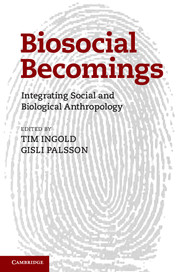Book contents
- Frontmatter
- Contents
- Preface
- 1 Prospect
- 2 Ensembles of biosocial relations
- 3 Blurring the biological and social in human becomings
- 4 Life-in-the-making: epigenesis, biocultural environments and human becomings
- 5 Thalassaemic lives as stories of becoming: mediated biologies and genetic (un)certainties
- 6 Shedding our selves: perspectivism, the bounded subject and the nature–culture divide
- 7 Reflections on a collective brain at work: one week in the working life of an NGO team in urban Morocco
- 8 The habits of water: marginality and the sacralization of non-humans in North-Eastern Ghana
- 9 ‘Bringing wood to life’: lines, flows and materials in a Swazi sawmill
- 10 Humanity and life as the perpetual maintenance of specific efforts: a reappraisal of animism
- 11 Ravelling/unravelling: being-in-the-world and falling-out-of-the-world
- 12 Retrospect
- References
- Notes on the contributors
- Index
2 - Ensembles of biosocial relations
Published online by Cambridge University Press: 05 June 2014
- Frontmatter
- Contents
- Preface
- 1 Prospect
- 2 Ensembles of biosocial relations
- 3 Blurring the biological and social in human becomings
- 4 Life-in-the-making: epigenesis, biocultural environments and human becomings
- 5 Thalassaemic lives as stories of becoming: mediated biologies and genetic (un)certainties
- 6 Shedding our selves: perspectivism, the bounded subject and the nature–culture divide
- 7 Reflections on a collective brain at work: one week in the working life of an NGO team in urban Morocco
- 8 The habits of water: marginality and the sacralization of non-humans in North-Eastern Ghana
- 9 ‘Bringing wood to life’: lines, flows and materials in a Swazi sawmill
- 10 Humanity and life as the perpetual maintenance of specific efforts: a reappraisal of animism
- 11 Ravelling/unravelling: being-in-the-world and falling-out-of-the-world
- 12 Retrospect
- References
- Notes on the contributors
- Index
Summary
Knowledge, including (and perhaps above all) biology, is one of the ways by which humanity seeks to take control of its destiny and to transform its being into a duty. For this project, man’s knowledge about man is of fundamental importance. The primacy of anthropology is not a form of anthropomorphism, but a condition for anthropogenesis.
Georges Canguilhem, Knowledge of life (2008 [1965]: 19).In a well-known passage in his Theses on Feuerbach, the sixth thesis, Marx observed (1998: 573) that ‘the essence of man is no abstraction inherent in each single individual. In its reality, it is the ensemble of the social relations.’ At least two points are worth noting about such a statement. For one thing, it suggests a relational, constitutive notion of the human being, an ‘ensemble’ firmly embedded in the company of others. A fifteenth-century term derived from medieval French (ensemblee), ‘ensemble’ denotes ‘all the parts of something considered together and in relation to the whole’ or ‘a unit or group of complementary parts that contribute to a single effect’ (The Free Dictionary 2010), one example of which would be a musical band. The other point concerns the notion of the ‘social’ which, for Marx, served to establish a contrast with Feuerbach, for whom the essence of humans could only ‘be regarded … as “species”, as an inner, “mute”, general character which unites many individuals only in a natural way’ (Marx 1998: 573; emphasis in the original). In Grundrisse, Marx similarly challenged the ‘illusion’ of the natural individual ‘posited by nature’ rather than ‘arising historically’ (1973: 83). A growing body of scholarship uses the sketch of Marx’s sixth thesis to engage with the human production of nature in the context of environmental issues. Loftus (2009: 161), for instance, suggests that ‘“Society” and “nature” are … thoroughly interwoven as an ensemble of socio-natural relations’. What might be gained by expanding Marx’s notion of the ensemble to address human becomings, by speaking of biosocial relations, and by collapsing the distinction between that which is posited by nature and that which arises historically? How might the life sciences of the twenty-first century, including anthropology, benefit from such an extension?
- Type
- Chapter
- Information
- Biosocial BecomingsIntegrating Social and Biological Anthropology, pp. 22 - 41Publisher: Cambridge University PressPrint publication year: 2013
- 37
- Cited by



